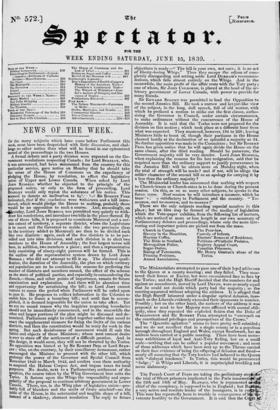The Ministerialists attempted to pass one of their loyal addresses
to the Queen at a county meeting; and they failed. They mus- tered their forces at Exeter, but were encountered face to face by the Tories ; and the High Sheriff decided that the numbers for and against an amendment, moved by Lord DEVON, were so nearly equal that he could not decide which party had the majority ; so the meeting separated without adopting the address. It is alleged that the High Sheriff laboured under a singular optical delusion, inas- much as the Liberals evidently exceeded their opponents in number. Possibly ; but on the other hand, the authors of the address it was proposed to send to her Majesty were afflicted with mental obli- quity, since they repeated the exploded fiction that the Duke of WELLINGTON and Sir ROBERT PEEL attempted to "encroach on the constitutional privileges and prerogatives of the Crown."
The " Queenite agitation" seems to have pretty well subsided ; and we do not recollect that in a single county or in a populous borough throughout England and Wales, except Southwark, has an address been carried at a public meeting. There have been nume- rous exhibitions of loyal and Anti-Tory feeling, but on a small scale—nothing that can be called a popular movement ; and most of those addresses which have been sent up to the Throne carried on their face evidence of being the offspring of delusion and fraud—. nearly all assuming that the Tory leaders had behaved to the Queen with "disloyal insolence." In Tories, this would be pronounced "fudge ; " in Whigs and Liberals, it is unprincipled truckling and mean dishonesty.


























